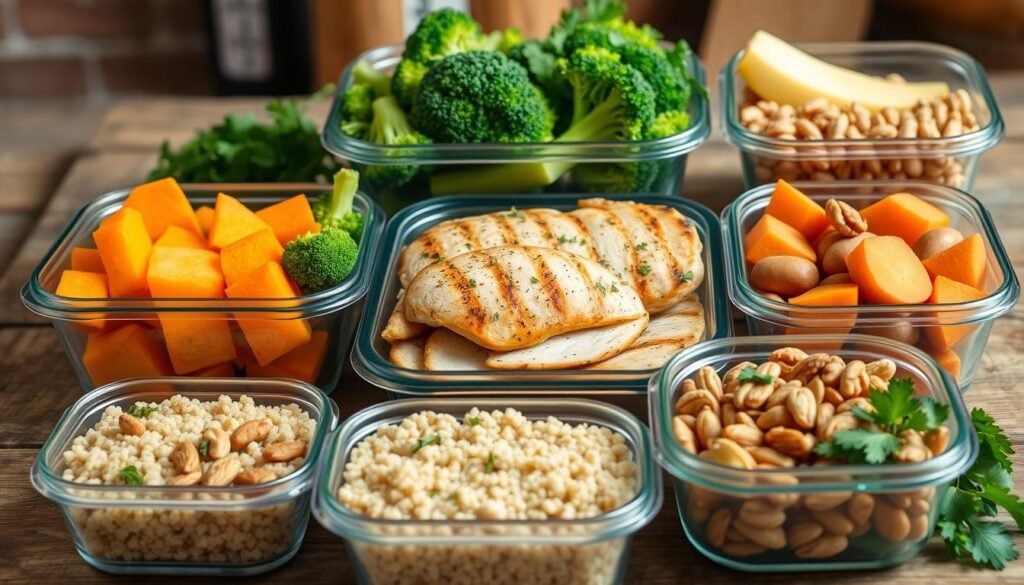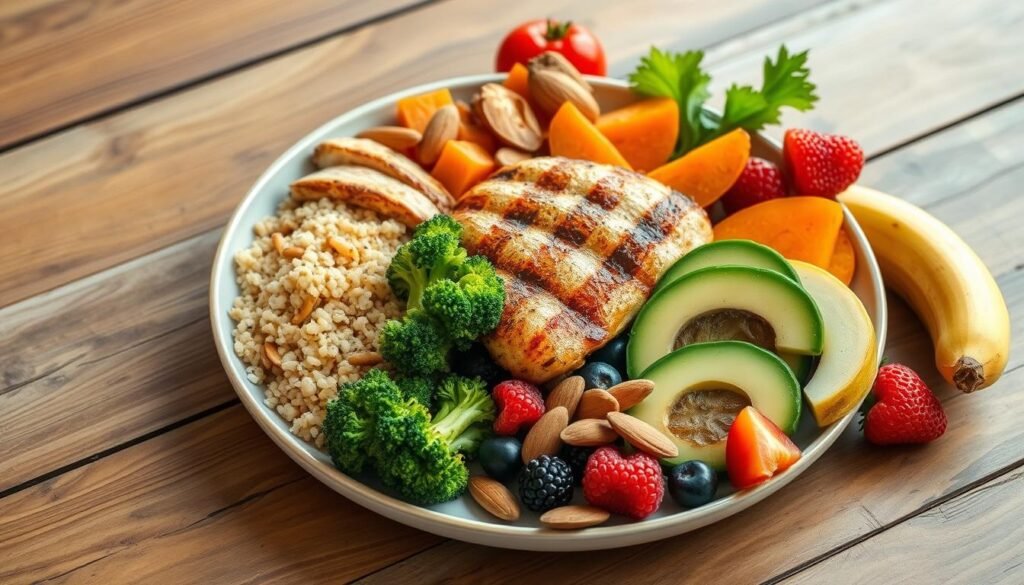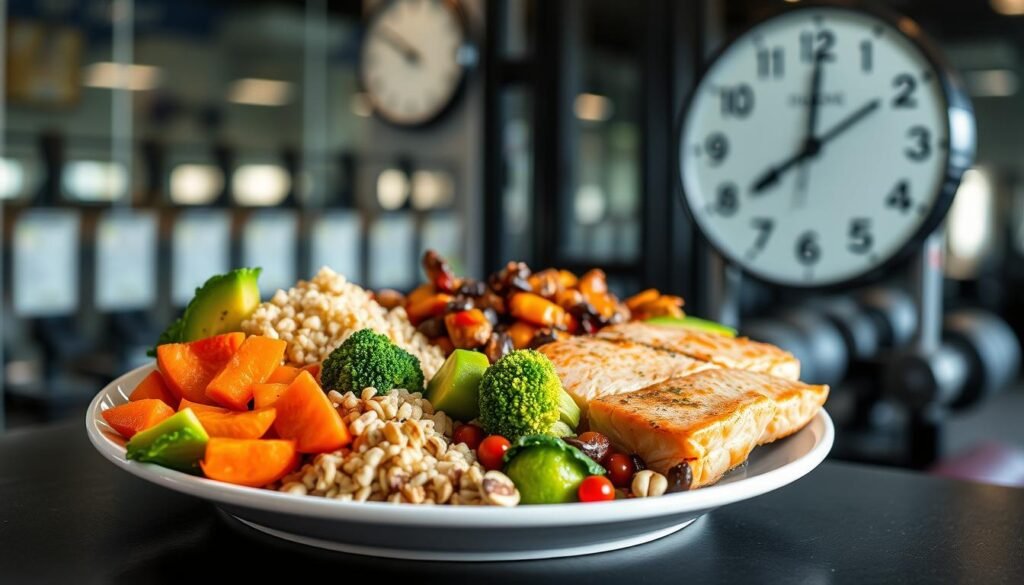Ever wonder why some easily build muscle, while others don’t despite hard work? It’s all about their meal planning for muscle growth. A proper meal plan helps fuel workouts, supports recovery, and boosts muscle growth. We’ll show you the importance of customized nutrition for reaching your fitness goals.
Key Takeaways
- Understanding muscle bulking requires knowledge of balanced meal planning.
- A muscle building meal plan is crucial for achieving desired muscle mass.
- Nutrition strategies directly influence muscle growth and overall health.
- Tailored nutrition guidance can optimize individual workout results.
- Effective meal planning is essential for long-term muscle bulking success.
Understanding Muscle Bulking
Muscle bulking is a key step in gaining muscle. It means increasing muscle size by eating more and training smartly. You consume more calories than you burn, creating a caloric surplus. This extra energy helps repair and grow muscle after workouts.
Strength training is essential in bulking. It involves exercises that challenge your muscles. This prompts your body to grow muscle in response. A good diet with the right balance of proteins, carbs, and fats is crucial. These nutrients help in muscle recovery and growth.
Bodybuilders need to switch between bulking and cutting. Bulking increases muscle through more calories. Cutting reduces fat but keeps muscle. It’s important to adjust your diet carefully in each phase. This helps achieve your goals without harming your health.
If you’re serious about bodybuilding, understand how muscle bulking works. Resources, like detailed meal plans, can help. They support your journey to reach your muscle goals.
The Importance of Balanced Nutrition
Balanced nutrition is key for building muscle. It involves the right mix of carbs, proteins, and fats. Carbohydrates are the main energy source. They power your workouts and help you give your best.
Proteins are crucial for muscle repair and growth. Healthy fats are needed for hormone production and using energy well. Together, these nutrients boost performance and recovery.
It’s also vital to eat a variety of micronutrients. Vitamins and minerals help with muscle recovery and keep you healthy. Eating lots of fruits, vegetables, and whole foods gives you these important nutrients. This helps your body recover better and perform well during workouts.
Having a balanced approach to eating helps with consistent meal planning. This not only aids in muscle building but also improves overall health. It sets the foundation for a lasting fitness routine.
| Macronutrient | Function | Sources |
|---|---|---|
| Carbohydrates | Primary energy source for workouts | Oats, rice, fruits, vegetables |
| Proteins | Muscle building nutrients for repair and growth | Chicken, fish, eggs, tofu |
| Fats | Supports hormone production and energy | Nuts, avocados, olive oil, seeds |
Balanced Meal Planning for Muscle Bulking
To reach muscle bulking goals, a well-planned strategy is key. It’s vital to know your objectives and pick the right balance of nutrients to see results. This part shares key meal planning strategies to boost muscle growth and recovery.
Defining Your Goals
Start by setting clear, realistic goals. Your goals can be to gain weight, get stronger, or perform better. Here’s what to consider while setting your goals:
- Set a target weight based on healthy standards.
- Determine a timeline for achieving specific milestones.
- Assess body composition changes, aiming for gradual progress.
- Incorporate strength benchmarks to measure success.
Choosing the Right Macros
Once goals are set, find the right macro balance. Having balanced macros for bulking helps with muscle repair and growth. Here’s the usual macronutrient mix for a bulking phase:
| Macronutrient | Percentage of Total Calories | Function |
|---|---|---|
| Protein | 25-30% | Muscle repair and growth |
| Carbohydrates | 50-60% | Energy source for workouts |
| Fats | 15-25% | Hormone regulation and overall health |
Match these macros with your calorie needs for effective bulking. A customized approach boosts meal planning strategies. It helps keep moving toward muscle bulking goals.
Creating a Muscle Building Meal Plan
Creating a meal plan for muscle growth involves some must-know elements. First, it’s crucial to understand caloric surplus essentials. You need to eat more calories than you use. This helps your body make new muscle. Getting the right number of calories is the first step in this plan.
Caloric Surplus Essentials
To start, figure out how many calories you need every day. You can use the Mifflin-St Jeor equation for this. It looks at your age, weight, height, and how active you are. Then, add 250 to 500 calories to that number. This helps you gain muscle without too much fat. Keeping track of what you eat helps you keep up this surplus.
Meal Frequency and Portion Sizes
How often you eat is key in a muscle-building plan. Eating every three to four hours is best. It keeps muscle building and energy levels up. Smaller, frequent meals let your body use nutrients better. Making sure your meals are the right size is important too. Include protein, carbohydrates, and healthy fats for energy and recovery.
Protein-Rich Diet for Bulking
A protein-rich diet for bulking is key for muscle growth and recovery. Eating high protein foods meets daily needs. Options include lean meats, fish, dairy, lentils, and quinoa to boost muscle gains.
Eating high protein foods all day helps with muscle recovery. Protein should be in every meal to help muscle grow. Start the day with protein, like scrambled eggs or Greek yogurt with fruits, for muscle repair and growth.
To help plan meals, look at this table of high protein foods and their protein content:
| Food Item | Protein Content (per serving) |
|---|---|
| Chicken Breast (100g) | 31g |
| Tuna (100g) | 29g |
| Chickpeas (1 cup) | 15g |
| Almonds (28g) | 6g |
| Greek Yogurt (200g) | 20g |
Eating these high protein foods supports bulking goals. It’s key for muscle recovery and boosts performance and growth. For meal planning, check out this guide for more tips.
Healthy Meal Prep for Muscle Growth
Meal prepping can make your journey toward muscle growth easier. It keeps you on track with your nutritional goals. By preparing meals ahead of time, you save time and eat healthier. This guide will show you how to cook and store meals in batches.
Batch Cooking Techniques
Batch cooking saves you time and helps you avoid junk food. It involves cooking meals in big quantities. Here are some key tips:
- Plan a weekly menu focusing on protein-rich ingredients.
- Cook larger portions of grains, proteins, and vegetables all together.
- Use versatile recipes for mixing and matching ingredients with ease.
- Invest in high-quality containers for easy meal portioning.
Storing and Reheating Meals
Storing meals right is important to keep them fresh and nutritious. Following these tips can help avoid spoilage and keep flavors rich:
- Store meals in airtight containers to keep them fresh.
- Label containers with the preparation date to track easily.
- Refrigerate meals for short-term use, and freeze them for the future.
- When reheating, use the microwave or oven to keep the food tasty.

Popular High Calorie Meal Ideas for Bulking
Finding high calorie meals that taste good can help you gain weight. We have some great breakfast ideas. They are full of energy and flavor. For lunch and dinner, we’ve got meals that make sure you get enough calories.
Breakfast Options
- Oatmeal with Nut Butter: Kick off your day with oatmeal and some nut butter on top. It’s a mix of healthy carbs, protein, and fats. Perfect for gaining weight.
- Protein Shakes: Whip up a protein shake with whey protein, whole milk, and a banana. It’s quick, full of calories, and helps after workouts.
- Greek Yogurt Parfait: Make a layer of Greek yogurt, granola, and mixed berries. It’s delicious, high in protein, and packed with nutrients.
Lunch and Dinner Ideas
- Quinoa Bowl: Try a quinoa bowl with grilled chicken, avocado, and black beans. It’s a mix of protein, carbs, and healthy fats.
- Pasta with Cream Sauce: Enjoy whole grain pasta with Alfredo sauce and chicken. It’s creamy, high in calories, and great for bulking up.
- Steak and Sweet Potatoes: Have a thick steak with roasted sweet potatoes. This meal is full of calories and very satisfying.
Best Foods for Muscle Bulking
Choosing the right foods is crucial for muscle bulking. The top foods for muscle bulking boost nutrition and performance. They combine protein and healthy carbs. This mix gives the body energy for workouts and helps it recover.
Top Protein Sources
Protein is key for muscle repair and growth. Different proteins provide various amino acids and nutrients. Include these top protein sources:
- Chicken breast
- Lean beef
- Eggs
- Greek yogurt
- Lentils
- Quinoa
Healthy Carbohydrates
Healthy carbs are vital for energy during muscle building. Opt for complex carbs instead of simple sugars. They provide steady energy. These carbs are great for bulking up:
- Brown rice
- Whole-grain pasta
- Oats
- Sweet potatoes
- Quinoa
- Whole-grain bread

Adding these proteins and carbs to your meals will help gain muscle. They make workouts better. They’re key for anyone wanting to bulk up.
| Protein Sources | Benefits |
|---|---|
| Chicken breast | Low in fat and high in protein. |
| Lean beef | Rich in iron and B vitamins. |
| Eggs | Complete amino acid profile, ideal for recovery. |
| Greek yogurt | High in protein and probiotics for gut health. |
| Lentils | Great plant-based protein with fiber. |
| Quinoa | Complete protein and gluten-free grain. |
| Healthy Carbohydrates | Benefits |
|---|---|
| Brown rice | Good source of fiber and long-lasting energy. |
| Whole-grain pasta | Higher in nutrients compared to white pasta. |
| Oats | Rich in beta-glucan, helps with cholesterol levels. |
| Sweet potatoes | High in vitamins A and C, and fiber. |
| Quinoa | Versatile, high-protein grain that is gluten-free. |
| Whole-grain bread | Nutrient-dense carbohydrate option for meals. |
Effective Meal Planning for Muscle Mass
For those looking to gain muscle mass, strategic meal planning is key. It’s not just about choosing the right macros for growth, but also how you arrange your meals. By keeping track of meals, you can hit your daily calorie and nutrient goals. This is crucial for building muscle.
Using meal plan templates can make things easier. These help you plan your eating for the week or month. By checking and adjusting your plans, you can see better results.
Here’s a sample weekly meal plan template for effective meal planning for muscle mass:
| Day | Breakfast | Lunch | Dinner | Snacks |
|---|---|---|---|---|
| Monday | Oatmeal with protein powder | Chicken salad with quinoa | Grilled salmon with broccoli | Greek yogurt with nuts |
| Tuesday | Scrambled eggs with spinach | Tuna sandwich on whole grain bread | Beef stir-fry with bell peppers | Hummus with carrot sticks |
| Wednesday | Smoothie with fruits and protein | Turkey wrap with avocado | Pasta with chicken and pesto | Almonds and dried fruit |
| Thursday | Greek yogurt with berries | Quinoa bowl with black beans | Baked tilapia with sweet potatoes | Hard-boiled eggs |
| Friday | Cottage cheese with pineapple | Grilled vegetable and chicken panini | Lamb chops with asparagus | Protein bar |
| Saturday | Pancakes with syrup and nuts | Chickpea salad | Shrimp tacos with cabbage | Nut butter on whole grain toast |
| Sunday | French toast with berries | Steak with sweet potato fries | Vegetable and bean casserole | Fruit smoothie |
Staying consistent with meal planning helps you reach your muscle mass goals. Matching your meals with your workouts and aims boosts progress. This way, you can successfully build the muscle you want.
Meal Timing for Muscle Growth
Understanding how to time meals for muscle growth can really boost your results. Athletes know how crucial nutrient timing is for doing their best. Getting the right mix of macros at the right times helps muscles recover and grow faster.

Eating the right meals around your workout is key. Having a meal with both protein and carbs two hours before exercising sets you up for success. After working out, your body is ready to rebuild muscle. Eating protein and carbs then can increase your gains. This shows why eating at the right times is so important for athletes.
Adding snacks before and after exercise helps with nutrient timing, too. A protein shake or a banana before working out is a good idea. After, try Greek yogurt with fruit or a balanced meal for muscle repair. Using these tips can help you get the most from your workouts.
If you want deeper info on meal timing for muscle growth, check out this detailed guide here. Being careful with meal planning and timing can help athletes reach their muscle-building targets.
Conclusion
For successful muscle bulking, a well-thought-out nutrition plan is key. This means eating right to meet your fitness goals. Knowing how to bulk up correctly lets you make meal plans that help your workouts and muscle growth.
Every part of your diet matters, from what you eat to when you eat it. Adding things like protein shakes or healthy foods can really help. But, you must be steady and keep an eye on your progress for the best results.
It’s time to use this knowledge to make your own nutrition plan. With careful planning and dedication, you can boost your muscle bulking. Reach for your fitness dreams with confidence.